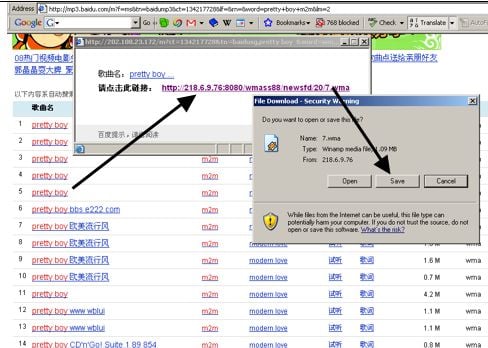Baidu is renowned as China’s glittering internet success story, and as the start-up that gave Google a bloody nose. It dominates the web in the world’s second biggest economy with 70 per cent market share, and on Wall Street carries a market cap of almost $12bn.
But Baidu’s success comes at a price, for the legitimate music business, for the development of China and of its intellectual property (IP) law, and for any internet company wishing to do business in China.
Baidu owes its success to its MP3 Search service, which takes surfers directly to music. It’s known as “deep linking”, and early this year, sound recording owners represented by IFPI filed a copyright infringement case against Baidu, claiming damages worth $9m.

Yet the scale of Baidu’s operation, uncovered by a forensic six-month investigation conducted in China for The Register, has surprised the music business.
“Although we already had some doubts about Baidu mp3 search, when we saw the investigation results presented, it was really a shock,” Susanna Ng, EMI Music Publishing Managing Director, Asia Pacific told China’s Fortune Times.
Music searches using Baidu return results that are heavily skewed in favour of unlicensed music, while they rarely return search results for licensed music sites. Meanwhile, the unlicensed MP3s appear to systematically move around a complex network of domains in response to infringement notices.
Chinese web surfers may be forgiven for missing the news. Baidu fails to link to news stories critical of the company, including some of the findings below; these have been covered only by a handful of publications within China. It’s a chilling reminder of the ability of a web search engine to control and shape public discourse.
We’ll explain what Baidu does, and why it’s in trouble. And the grim prospects for anyone hoping to build an internet business in China — with an unstoppable Baidu.
What does Baidu do?
Most full-length recorded music in China is unlicensed, infringing material. Some estimates put the figure as high as 98 per cent. A popular act can expect to sell as few as 2,000 copies. Yet China is not quite the lawless frontier these figures suggest.
In March this year, another Chinese top five music search engine, Zhongsou had its servers seized and subjected to the maximum fine for copyright infringement by state administration authorities. This was the first public case of a music search engine being convicted for hosting MP3 files. Government appointed bodies such as the Music Copyright Society of China (MCSC) and the China Audio-Video Copyright Association (CAVCA) are both active in attempting to support businesses that reward the creators. Baidu’s notorious MP3 Search is the biggest problem they face.
MCSC’s Director of Legal Services Liu Ping used the following real life analogy to describe deep-linking:
“If Google’s search works as a guide by giving directions and telling you the address while taking you right to the door of your destination, Baidu’s search brings you directly through the door, right inside the room and helps you take away the CD from shelves without the owner’s permission.” Liu Ping considers this to be beyond the scope of a search engine, and a practice which moves Baidu into the area of transmission of music.
Baidu has amassed numerous lawsuits over the practice, with MCSC and the IFPI involved in a number of these. Baidu’s defence is that as a network service provider it cannot be responsible for the legality of the sites it indexes and is therefore not liable for damages. Nevertheless, Article 23 of China’s Copyright Law says that it is jointly liable “where it knows or has reasonable ground(s) to know” that the linked works are infringing material.
However, our investigation suggests close enough linkage between Baidu’s business and the infringing material for it to be viewed as something more than ‘just’ a network service provider.
Baidu’s MP3 Search was monitored for six months at the end of last year, analyzing search results using 600 songs spread across multiple genre. A number of areas that seemed incongruous to a pure and neutral search engine were discovered, and three details emerged.
Firstly, a network of mysterious sites with closely related domain names contributed more than 50 per cent of the search links returned by Baidu. The songs hosted on the mystery sites were unreachable except through the Baidu search engine. Furthermore, infringement notifications resulted in unlicensed songs simply moving from one of these domains to another.
Secondly, Baidu does not link to the two leading paid download sites in China, 9Sky and Top100. While Google for example will return results for a song search to licensed providers (7Digital, Amazon, eMusic or even iTunes) as well as Torrent trackers, Baidu is much more selective.
Thirdly, music blogs and forums naturally form a significant source of music search links for any search engine. But with Baidu, these contributed to only 30 per cent of the music search links on Baidu’s MP3 Search.
The cumulative effect is to keep the “free music flowing” for Baidu’s users — with devastating consequences not just for creators, but for rival internet businesses.
